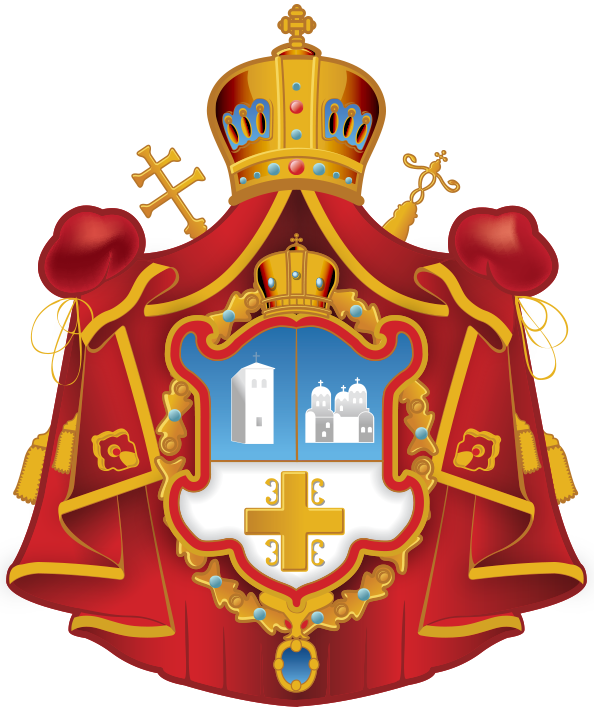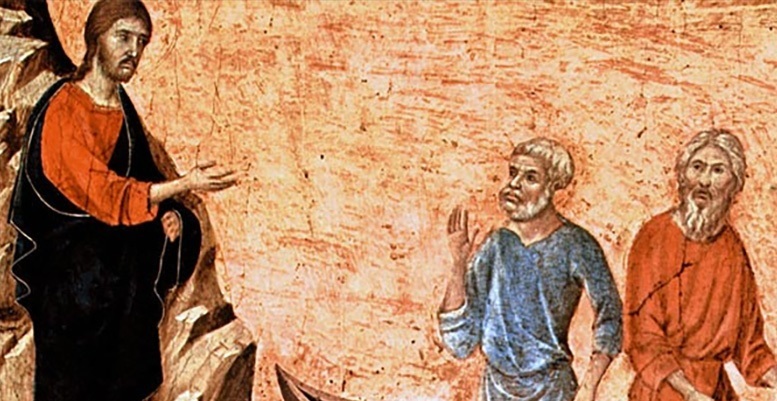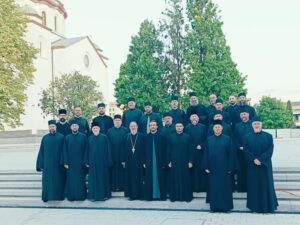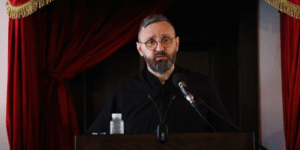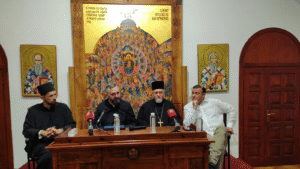Saint John Chrysostom immediately draws our attention to the virtue of the apostles and describes their readiness to follow the Lord Jesus in the following manner: “Observe their faith, observe their obedience. They were occupied with their work—fishing, which we all know to be captivating—yet, the moment they heard the call of the Savior, they did not hesitate, they did not postpone their decision for another time, nor did they say: ‘Let us first go home and consult with our kin.’ Leaving everything behind, they followed the Lord just as Elisha once followed the prophet Elijah. Christ demands of us such obedience that we should not delay even for the slightest moment, even if the most urgent need requires it. That is why the Lord did not allow the man who approached Him and asked for permission to bury his father (cf. Mt. 8:21). In this way, He demonstrated that everything must be subordinated to following Christ. You might say that much was promised to them. But that is precisely what makes their faith admirable, for they believed in so great a promise before witnessing a single sign. They followed Christ, preferring Him above all. They believed that they would be able to catch others with the same words by which they themselves had been caught. Moreover, that promise was given only to Peter and Andrew; to James and John, nothing of the sort was said—only the example of obedience set by the first two opened the way for the others. Still, they had heard much about Jesus even before this moment.”
Saint Gregory the Dialogist addresses a vital aspect relevant to us concerning the apostles’ act of leaving everything to follow the Lord. He explains how we, too, can emulate the apostles in the following way: “You also, brethren, abandon much if you renounce earthly desires. For our external possessions, however small they may be by worldly standards, are enough for the Lord, because He weighs the heart, not the substance. He does not assess how heavy the offering is, but with what disposition it is given. The true Kingdom of God has no external price; rather, it may be purchased for as much as you possess. For Zacchaeus, the price was half of his possessions, for he kept the other half in order to restore fourfold to those he had wronged. For Peter and Andrew, the price was the forsaking of their boat and nets; for the widow, it was two mites; for another, a cup of cold water. Therefore, as we have said, the price of the Kingdom of God is as much as you have.” This thought by Saint Gregory can help us greatly at times when we believe that our circumstances and manner of living are insufficient for salvation. By His providence, the Lord wisely arranges the external conditions of our life, giving us everything necessary, and it is only up to us to be attentive—to see and understand how we can use what we have to attain the Kingdom of Heaven.
Saint Nicholas of Ohrid, from a different angle, reveals the greatness of the apostles’ sacrifice, focusing on the inner movement of their souls and their trust in God. He writes: “Do you see how the hearts of these two brothers were already disposed toward goodness? They did not ask: ‘Where are you calling us? How will we feed ourselves? Who will provide for our families?’ It was as if their entire lives they had only been waiting and listening for such a call. Like innocent children, they entrusted all their cares to God, left everything behind, and followed Christ’s call.”
Let us now continue with verses 21 and 22:
And going on from there, He saw two other brothers, James the son of Zebedee and John his brother, in the boat with Zebedee their father, mending their nets; and He called them. And immediately they left the boat and their father and followed Him.
Saint John Chrysostom draws attention to these two other brothers, showing that their sacrifice equaled that of Peter and Andrew, while also emphasizing their endurance in great poverty. Here is how Chrysostom explains this: “Note with what precision the Evangelist points to their poverty. Jesus found them mending their nets.”
They were so poor that they could not afford to buy new nets, and so they mended their worn-out ones. Yet, their poverty was something they bore with ease, which in itself is a powerful testimony to their virtue. They sustained themselves through honest labor, were bound together by love, lived in unity with their father, and served him.
In this context, Saint Nicholas of Ohrid addresses an essential question in the spiritual life—one that many Christians struggle with: the nature of the relationship between God and man, particularly God’s involvement in human life. Saint Nicholas writes of a criterion that God indeed takes into account in the following way: “This is why Christ addresses them with a commanding voice: Follow Me! In the same way, God deals with all of us. He does not force us onto the path of salvation but allows us, in freedom and discernment, to choose salvation or destruction. But when God, who sees our hearts, notices that our hearts incline toward the path of good and salvation, He decisively draws us onto that path. On the other hand, when He sees that our hearts are entirely turned toward destruction and evil, then He utterly withdraws from us, and Satan becomes our master. Such was the case with Judas the betrayer. When his heart had fully turned to evil and committed itself to the path of darkness and ruin, Christ no longer sought to turn him back. On the contrary, seeing that Satan had already entered into Judas, the Lord said to him: What you are about to do, do quickly. Thus, neither in the case of Peter and Andrew, nor in the case of Judas, does the Lord in any way violate human freedom; rather, once people have determined in their hearts for good or evil, He speaks decisively—to Peter and Andrew: Follow Me! and to Judas: What you are about to do, do quickly.” This profound insight by one of our Church’s great saints offers the true and only answer to why, in the lives of some people, God is present, while in the lives of others He is not. It is not due to God’s unwillingness. Were God to override human free will, all would be saved, for as Scripture says, God desires all people to be saved and to come to the knowledge of the truth (1 Tim. 2:4). The matter rests solely with us and with our decision—whether we want to be with God or not. For God, there are no obstacles.
Saint Chromatius of Aquileia highlights the “illogicality,” as it might appear, in Christ’s choice of His apostles—that is, why the Lord selected His apostles from among the uneducated and impoverished fishermen. Human reasoning, both in our time and in His, would suggest it far wiser to choose powerful, respected, and influential individuals whose social standing could assist in amplifying the message of Christ’s preaching. Saint Chromatius explains it this way: “O blessed are these fishermen whom the Lord, amid so many scribes and scholars of the law, chose as the first for divine preaching and the grace of apostleship. This choice was wholly worthy of our Lord and fitting for His proclamation… The apostles did not capture the world through eloquence or wisdom, but through the simple preaching of faith they freed the human race from the delusion of death, as the Apostle says: So that your faith might not rest in the wisdom of men but in the power of God (1 Cor. 2:5). And again: But God chose what is foolish in the world to shame the wise; God chose what is weak in the world to shame the strong; God chose what is low and despised in the world, even things that are not, to bring to nothing things that are (1 Cor. 1:27–28). Thus, the Lord Jesus did not choose the well-known or the wealthy, so that His preaching would not fall under suspicion; nor did He choose philosophers, lest anyone believe that He persuaded mankind by the wisdom of this world. Instead, He chose fishermen—unlearned, unlettered, and simple—so that the grace of the Savior might be made manifest.” This Gospel passage provides a clear response to the many accusations found in so-called “objective” documentaries about the Church, which often claim that Christianity only spread due to political power, coercion, or force. If this were true, the Lord would have chosen as His apostles figures like Pontius Pilate, Caiaphas, or Herod. Had it depended on worldly power, the Church would never have endured the countless persecutions throughout its history. The Gospel itself offers the definitive response to these falsehoods.
We now continue with the reading of the final verses of the chapter, from verse 23 to 25:
“And Jesus went about all Galilee, teaching in their synagogues, and preaching the gospel of the Kingdom, and healing all manner of sickness and all manner of disease among the people. And His fame went throughout all Syria: and they brought unto Him all sick people that were taken with diverse diseases and torments, and those which were possessed with devils, and those which were lunatic, and those that had the palsy; and He healed them. And there followed Him great multitudes of people from Galilee, and from Decapolis, and from Jerusalem, and from Judaea, and from beyond Jordan.”
Saint John Chrysostom speaks of the profound order in Christ’s actions, noting that the Lord calls the apostles and only then, in their presence, begins to work miracles. In this way, Jesus confirms through action what Saint John the Forerunner had previously proclaimed about Him—testimony that the apostles themselves had heard (cf. John 1). The Lord frequently visited synagogues, teaching His disciples that He was not opposed to God but rather fulfilling His will.
Saint Chromatius of Aquileia, interpreting these verses, refers to the famous prophecy of Isaiah and writes: “Isaiah foresaw this earlier, saying: ‘Surely He has borne our infirmities and carried our diseases’ (Isaiah 53:4). For this very purpose the Teacher of life and the heavenly Physician, the Lord Christ, came: that by His words He might teach men the way of life, and by heavenly healing cure both the diseases of soul and body; to free the bodies seized by the devil and to restore true and vigorous health to those exhausted by various afflictions. For bodily ailments the Lord heals with the word of divine power, and spiritual ailments with the medicine of heavenly teaching. David clearly shows that only God can heal the wounds of the soul: ‘Bless the Lord, O my soul, and forget not all His benefits—who forgives all your iniquities, who heals all your diseases’ (Psalm 103:1–2). Therefore, the true and perfect Physician is He who grants bodily health and restores the soul to salvation—our Lord and Savior.”
These words of the saint are important, as they show in whom we should place our trust when we find ourselves in illness or distress. However, this does not mean we should reject doctors. Among some Christians, there exists the notion that turning to doctors reflects a lack of perfect faith. Yet Holy Scripture clearly says: “Honour a physician with the honour due unto him for the uses which ye may have of him: for the Lord hath created him. For of the Most High cometh healing, and he shall receive honour of the king. The skill of the physician shall lift up his head: and in the sight of great men he shall be in admiration. The Lord hath created medicines out of the earth; and he that is wise will not abhor them” (Sirach 38:1–4).
Saint Basil the Great offers a summary of the Church’s teaching in this regard: “Just as it is not necessary to completely avoid medical skill, so it is not good to place all hope in it. Just as we use the skill of farmers, yet ask the Lord for crops; or entrust the rudder to a ship captain, yet pray to God for deliverance from shipwreck—so also when we call a doctor, we do not forsake our hope in God.”
Saint Nikolaj of Ohrid reflects on the fervor the Lord demonstrated in fulfilling the work for which He came among men: “After thirty years of hidden life, the Lord Jesus now begins His divine ministry—and He begins it with diligence and determination. This is what is meant by the phrase: ‘He went about all Galilee.’ His ministry consisted in interpreting the Old [Law], proclaiming the New, and confirming both through the miracles of healing.”
This patristic interpretation of chapter four concludes with an elevated reflection by Saint John Chrysostom, who explains why the Lord worked so many healings and miracles before beginning His public preaching: “Every time something new is introduced … or a new way of life is established, God customarily gives signs as a guarantee of His power for those who are to accept His commandments. Thus, when God intended to create man, He first created the whole world, and then gave man a law in Paradise. When He wanted to give the law to Noah, He again performed great miracles—He altered all of creation at its foundations, commanded a terrible flood to cover the earth for a full year, and preserved the righteous man unharmed amidst a great storm. Similarly, Abraham was surrounded by many miracles… And before giving the Law to the Jews, God again showed great and marvelous signs. So also here, intending to give the highest commandments of life and propose to mankind something never before heard, He confirms His words through miracles. Since the Kingdom which the Lord proclaimed was invisible, God made it visible through manifest signs… One might ask: why did Christ not demand faith from any of those He healed? Why did He not say what He later would: ‘Do you believe that I am able to do this?’ (Matt. 9:28)? It was because He had not yet demonstrated the proofs of His power. Yet the great faith of these people is shown in that they came to Him and brought Him the sick. They would not have done so from afar if they did not have great faith in Him.”
Adapted for the contemporary reader, based on the teachings of the Holy Fathers, by Stanoje Stanković.
